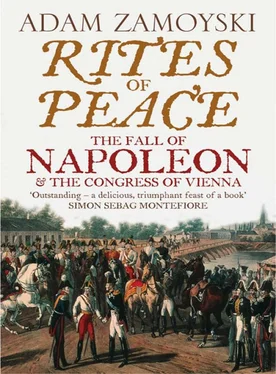For a Continental power, a battle won brought no such advantages, while a battle lost often entailed the ravaging of its own territory and the necessity to sue for peace on any terms. The British, safe behind their watery defences, could not understand this predicament. They had no experience of foreign invasion and occupation, and bemoaned their allies’ lamentable tendency to sue for peace at the first setback. They tended to look upon any state that had been forced to do so as an enemy. Having no first-hand experience of fighting against Napoleon, the British were inclined to attribute his victories to the failings of their allies’ armies and the pusillanimity of their governments. This seemed to be borne out when the one Continental power as strategically invulnerable as Britain, Russia, submitted to Napoleon in 1807.
In the event, Russia had only done so because her Austrian ally had been defeated and forced to sue for peace, her Prussian ally had been shattered and reduced to nothing, and her British one was incapable of sending a single regiment to assist her. But Castlereagh, like Pitt before him, could not imagine what it was like to be left isolated facing a victorious Napoleon across a corpse-strewn battlefield. All he knew was that coalitions tended to fall apart, and he ascribed this principally to their not having a clearly defined purpose and a mechanism to ensure that all parties stuck to it until it was achieved.
As he watched events unfold on the Continent in the spring of 1813, Castlereagh determined that he must somehow ensure that the allies in this incipient coalition would make war together and peace together, on terms agreed mutually and properly defined. That was not going to be easy.
Britain’s diplomats had been excluded from a large part of the Continent for the past fifteen years and from the rest of it for the past three or four, so there was a dearth of knowledge in London as to what was going on in various countries and who the important players were. There was a corresponding lack of experienced diplomats, just at the moment when Castlereagh needed them. To Russia he had sent Lord Cathcart, an old soldier with scant diplomatic experience. To Prussian headquarters he now despatched his own half-brother, Sir Charles Stewart, another soldier, and not a particularly distinguished one at that. Stewart was thirty-five years old. He had served on Wellington’s staff in the peninsula, where he had displayed impetuous courage but none of the qualities requisite for a command – ‘A most gallant fellow, but perfectly mad,’ in the words of a brother officer. Stewart would probably have approved of that description. ‘My schemes are those of a Hussar at the Outposts,’ he wrote to the painter Thomas Lawrence before taking up his first diplomatic post. ‘Very short, very decided, and very prompt.’ 8
Castlereagh’s instructions to these two dealt mainly with the extent of the subsidies which Britain was to contribute to the allied cause. But they also sketched out the basis of a final settlement towards which they were to work, and expressed the desire to bring about a closer union that would bind the allies to achieving those goals – he did not want this coalition disintegrating like the others, and he did not want the allies making a separate peace once they had achieved their own objectives, leaving Britain out in the cold. He already saw himself in the role of guiding spirit of this budding coalition, and had ambitious plans for it. But he did not as yet contemplate extending it to embrace Austria, and his mistrust of Metternich was so great that he would not even listen to what the Austrian envoy Wessenberg had to say.
Конец ознакомительного фрагмента.
Текст предоставлен ООО «ЛитРес».
Прочитайте эту книгу целиком, купив полную легальную версию на ЛитРес.
Безопасно оплатить книгу можно банковской картой Visa, MasterCard, Maestro, со счета мобильного телефона, с платежного терминала, в салоне МТС или Связной, через PayPal, WebMoney, Яндекс.Деньги, QIWI Кошелек, бонусными картами или другим удобным Вам способом.












